Contemprary Tanka Poet Mariko Kitakubo. Media coverage.
Click the url below to move to the latest edition of Monthly Magazine "WENDY".
https://www.wendy-net.com/wendy/original/index.html
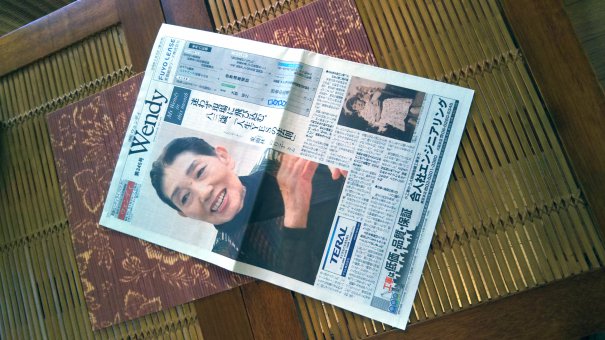 |
|
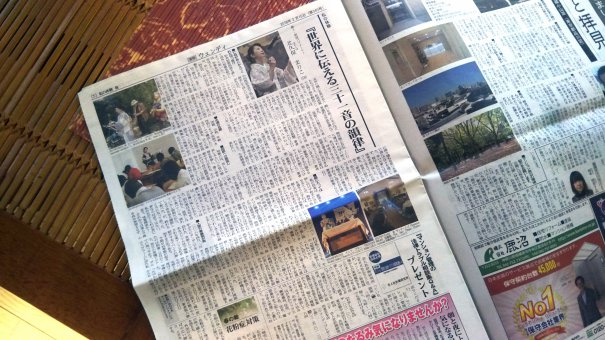 |
Below is the translation of the article.
DETERMINATION TO INTRODUCE 31 SYLLABLES TO THE WORLD
Mariko Kitakubo
Tanka Poet & Reading Performer
MY DECEASED MOTHER GAVE ME A CHANCE TO START
It was in 2005, almost 12 years have passed since I started composing TANKA, I decided to introduce TANKA overseas by my reading performance. This year is the 13th year of my bilingual TANKA reading performance activity overseas, and I did 134 sessions so far.
It was my anthology, "WILL", that brought me an opportunity. It is my third anthology which I compliled to memorialize my deceased mother, who raised me as a single parent and passed away suddenly due to subarachnoid hemorrhage. Ms. A. F., an English poet in Sydney, was deeply impressed with it, and asked me to perform tanka reading at her publication party.
September 2005, my first TANKA reading performance finished with a very big applause of audience in Canberra, Australia. One beautiful elderly lady come to me and told me, "the language of your country sounds so beautiful as a piece of music!" I have never had such an idea until she told me so. Her comment gave me a delightful suprise, and have been motivating me to continue my bilingual reading performance activity. Even those who have interest in the Japanese literature are able to touch upon MATSUO BASHO or MASAOKA SHIKI only through translated versions. Why don't I deliver the Japanese unique sound and meter which has been succeeded over thousands of years! I made up my mind at that time.
One wonderful encounter brought me another. In 2006, I received an offer from Canada, and in 2007 from America. So far, I presented my bilingual TANKA reading in 34 cities in 7 countries - Australia, Canada, America France, Swizzerland, Tanzania and India. (As of October, 2017)
ETERNAL AIM
My bilingual TANKA reading is composed with about 30 pieces of Japanese poems, all which have universal themes that anyone can empathize regardless nationality, religion, age or gender. I read them in Japanese and in English, taking the appropriate time while playing sound instruments by myself. Usually I select poems of elegy and love from MANYO-SHU, as well as my own piece which pray for the world's peace.
never until now
in this old life,
when white hair twine
among the black,
have I fallen into longing like this
(Ootomono Sakanoueno Iratsume, MANYO-SHU)
sounds
of the stream
in my homeland---
Strontium is soaking
into the placenta
(M. Kitakubo, INDIGO, the sixth anthology)
*the piece written after the nuclear power plant accident)
My eternal goal is to depart from "individual" of being myself and to become a "medium" to convey ideas from soul to soul. I would like to make continuous efforts to deliver the words breathed life to the audience.
RETURNING FAVOR TO TANKA
I believe that TANKA has a power to sublime negative emotions such as pain and sorrow, and to heal the person who writes it. Beause of this power, I was able to hold myself together for the last 17 days until my mother passed away. She fell down suddenly and turned into vegetative state. I sat down at my mother's bedside, and kept writing TANKA day in and day out as if breathing.
on a chilling morning
I realise that
for my mother
there will be
no next summer
(M. Kitakubo, WILL, the third anthology)
are they overflowing
with things she wishes
she could tell me ---
my mother's tearfull eyes
after more than ten days asleep
(M. Kitakubo, WILL, the third anthology)
I did all the procedures needs to be done after my mother is gone by myself. Of course, all of them had certain leeway until the due date, however, there were many documentations I had to process. I had no time to rest and struggled with papers. Literally, there was no time for cring.
After a while, I finished all the procedure. I took a breath, and remembered I had not been eating anything from the morning. I dropped by at an archaic Japanese noodle shop and ordered ZARU-SOBA. Although the sauce for soba noodle was dark enough, it tasted as light as consomme soup. The other customers looked satisfied with the food. They enjoy their meals while happily talking with accopanying persons. I was tired, and I did not want to bother with complaining about the taste to the shop-person, therefore, I added extra soy sause to adjust the flavor. When I almost finished my meal, I realized that it is not the shop, but me, that had trouble. I was suffering from taste disorder.
Since then, I have been trying to take rest consciously, and spending time by creating poems with the emotions piling up in my mind. Fortunately, my taste disorder did not last long. It was TANKA which supported me all the time. It can be said that I am returning a favor to TANKA by travelling alone and introducing TANKA overseas.
five years now
since I sat there
with late mother
supping on noodles
flavored with citron
(M. Kitakubo, INDIGO, the sixth anthology)
WHEN IN ROME...
Not to insist on my own ideas, but try to adapt myself to others. It is my belief. If I become too self-assertive overseas, people may feel not only myself but also TANKA is something self-centered and pushy.
Sometimes I encountere with the situation which require extra efforts. In many countries, my reading performance in English is understood as is. However, in the area in Switzerland bordering to Germany, I had to change the pronunciation particular to the area. Much patience was required, to be honest, but there was no other choice. There is no meaning to perform TANKA in English unless they understand.
INSCRUTABLE ARE THE WAYS OF HEAVEN
In April two years ago, I visited Tanzania after 15 years. I was invited to the event to introduce Eastern Asian Culture held in Dodoma University in the capital.
I fell into the unforeseen situation two days after I arrived in Tanzania. I received a cancellation notice of the event when I was in Dar es Salaam waiting for a flight to Dodoma on the following day. Well, that' life. Unexpected things may happen during travelling, regardless good or bad. It's no use resenting. I departed to Dodoma, anyway.
Ms. S, a Japanese teacher at the university, who bridged between the university and me, apologetically made a bow to me. It was not her fault. We exchanged the greetings of our first meeting with smile, and discussed what we could do. "It's kind of rare to see two Japanese ladies here. Are you planning something fun?" A tall, agreeable young gentleman talked to us at the door. He is Mr. M, the professor of literature of the university, and a friend to Ms. S. When we explained about the circumstances, he said to me, "If it is okay with you, could you perform bilingual TANKA reading in my class tomorrow morning?" Of course, I agreed to his offer right away. Right after Prof. M. left us, Prof. L of linguistics dropped by. "Did something good happen?", he said and gave me an offer. "Could you introduce 'TANKA' in my workshop the day after tomorrow?"
What an unexpected development! If the event had taken place as scheduled, I hadn't been able to meet these two Professors. It was literally a good fortune for me to have had opportunities to introduce TANKA to many young generation in Dodoma. Inscrutable are the ways of Heaven. If I did not go to Dodoma after receiving the cancellation notice of the event, I would not have had this good fortune.
I would like to keep gratitude to others always in my mind, and continue to seed TANKA all over the world.
pure indigo
settles down in my heart,
when I cross the border...
I would like to die
as a wanderer
(M. Kitakubo, the sixth anthology, INDIGO)
intently flowing
the river empties
into the sea,
its mouth like a border
between life and death
(M. Kitakubo, the sixth anthology, INDIGO)
Thursday, February 15, 2018
Newsletter of "Writers association aiming for abondoning-nuclear-power society" Vol. 11 issued in Nov. 2017 posted my article about my participation in "Hiroshima Memorial Event in Maruki Museum this summer.
Wednesday, November 22, 2017
Japanese newspaper, Nihon Keizai Shinbun, posted my interview.
English translation of the article is available below of this page.
Nihon Keizai Shinbun newspapser, Oct. 2nd issue.
"Culture" section
ECHO IN THE WORLD 31 SYLLABLES
Tanka reading performance overseas to deliver the prosody of historical and contemporary poetry that touches the audiences’ heart.
Mariko Kitakubo
I have been presenting Tanka reading performance in many places around the world. This year makes the thirteenth year for my activity. Visited 33 cities in the United States, Canada, France, Australia, Switzerland, Tanzania and India, I performed 132 times of Tanka reading to date. Although my main motivation is to deliver the beauty of Tanka as well as the profoundness of the sound which the Japanese language has, my activity also has an aspect of "returning the favor to Tanka."
In my performance, I read out twenty to thirty pieces of Tanka, slowly, and sometime refrain words in the poem. I change the vocalization according to the content of the poem, attaching intonation so that the audience can experience the beauty of the sound.
Use musical instruments to create "intervals"
I also use instruments to invite the listeners to a deeper world. A shaker makes sounds like ripples. A rain stick makes a sound reminiscent of rain. Small bells. And, iron-made percussion, "Hamon", which gently vibrates air when it is beaten or rubbed by drumsticks. These instruments are used to create some intervals so that the listeners are able to expand their imagination about the poem.
Most of the time, I perform reading poems from "Manyo-shu" at first, followed by my own Tanka pieces. I would like the audience to feel unchanging sound of the Japanese language even today 1,300 years after the Manyo period. This is the reason why I perform ancient Tanka poetry together with my own Tanka. I would like to deliver the deepness of Tanka to the people who do not understand Japanese.
I perform reading both in English and in Japanese. I change the order of the languages according to the situation. It may be more kind to offer English version first because they are able to understand the meaning of it. However, when I wish them to focus on the sound of the Japanese language, I read Japanese Tanka before its English version.
on the eastern fields
I can see the flames
of morning rise
turning around,
I see the moon sink in the west
(by Kakinomoto no Hitomaro)
When a non-Japanese audience heard this piece of poem written by Kakinomoto no Hitomaro contained in "Manyo-shu". She was so marveled and said, "It sounds as if a piece of music." Standing in the field of morning glow, you look back and find lingering moon - we feel this scene is beautiful regardless nationality.
Painfulness of adult’s love
never until now
in this old life,
when white hairs twine
among the black,
have I fallen into longing like this
(by Sakanoue no Iratsume)
Painfulness and heartrending sadness of adults romance may be another example of feeling which can be understood commonly especially among the aged people.
after hating him
for so long, now imbued
with the longing
of a child with no father
on Father's Day
(by Mariko Kitakubo)
I wrote this piece with my emotion toward my father from who I parted in life. I am deeply impressed when I find non-Japanese person show an empathy toward this sort of my personal emotion.
sounds
of the stream
in my homeland-
Strontium is soaking
into the placenta
(by Mariko Kitakubo)
This is another piece of my Tanka which I selected to convey the sadness of Japanese suffering from unprecedented calamity.
I started Tanka reading performance overseas in 2005. I was invited to the publishing party in Australia and performed Tanka reading when the translator of my anthology published her own book. Compared with Haiku being well known abroad, the recognition of Tanka is low. I simply wanted to convey the charm of Tanka, therefore, I did the reading with full expression. The audience showed favorable reaction toward my performance, and I started receiving requests to do Tanka reading from many different people.
There are many hardships. For example, delicate consideration is required to perform reading Tanka with the theme of conflict in the countries currently in war. When I visited Tanzania, the cultural event, in which I was scheduled to perform some reading, was suddenly canceled. I thought I could not go home without doing anything after all the way to come to Tanzania, I negotiated with a professor in the university and got some opportunities for me to present Tanka reading in class.
Sorrowfulness for the deceased mother
I am willing to go anywhere to present reading performance whenever I have opportunities. In the beginning, I wrote "returning the favor to Tanka", and there is a special and personal emotion attached to it. I grew up in a mother-and-a-child family. She got ill, and passed away in the hospital. While she was in intensive care unit for seventeen days, I was by my mother's bedside, and devoted myself to write Tanka. Writing Tanka was a spiritual support for me at that time.
After she breathed her last, the huge sense of loss made me taste disorder. However, again, it was Tanka that supported me in my tough days. I put my sorrow and painfulness into my Tanka, which helped me a lot to hold myself. And gradually, I was recovered.
To pass on the power that Tanka has is my way to returning the favor to Tanka. Thirty-one syllables are not just the words with meaning. They touch and move the heartstrings of the listeners. At the moment I start reading, my existence disappear and only the sound of words remains - it may be the ultimate form of reading poetry. I believe it is the moment when the emotion in the poetry touches the heart of the listeners. I may not be able to reach such a stage in my lifetime, however, I would like to make efforts to come closer to it.
Photograph: Mariko Kitakubo performs Tanka reading in Storrier Stearns Japanese Garden, Pasadena, California. Shakuhachi, a Japanese bamboo flute, played by Mr. R. Wilson.
Monday, October 2, 2017
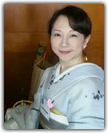
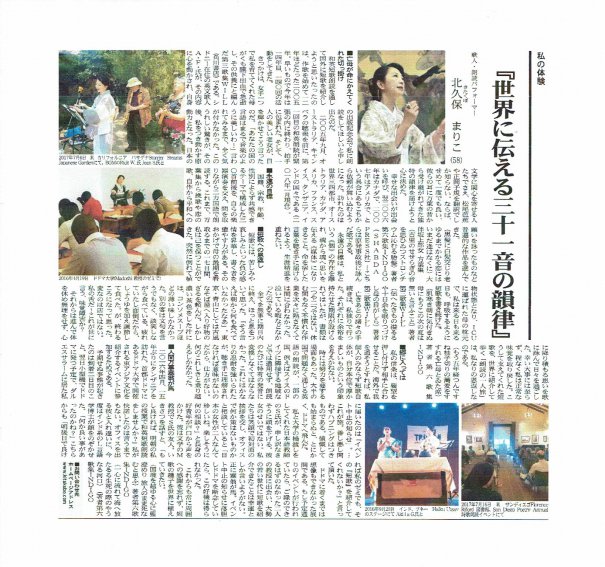
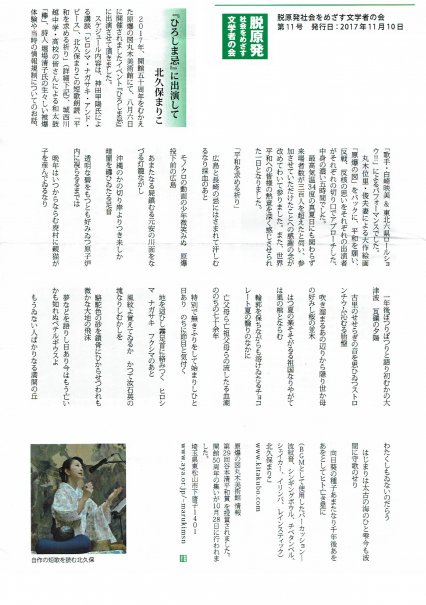
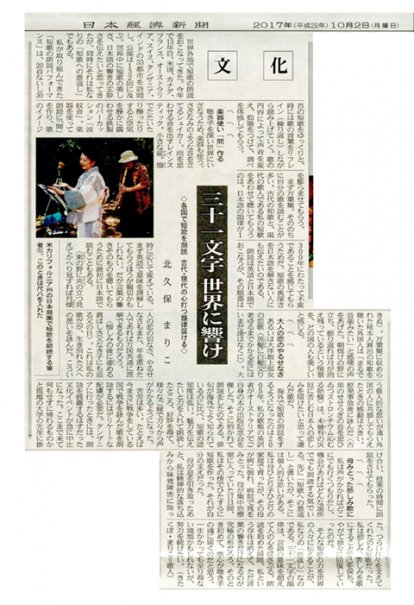
 Prev
Prev